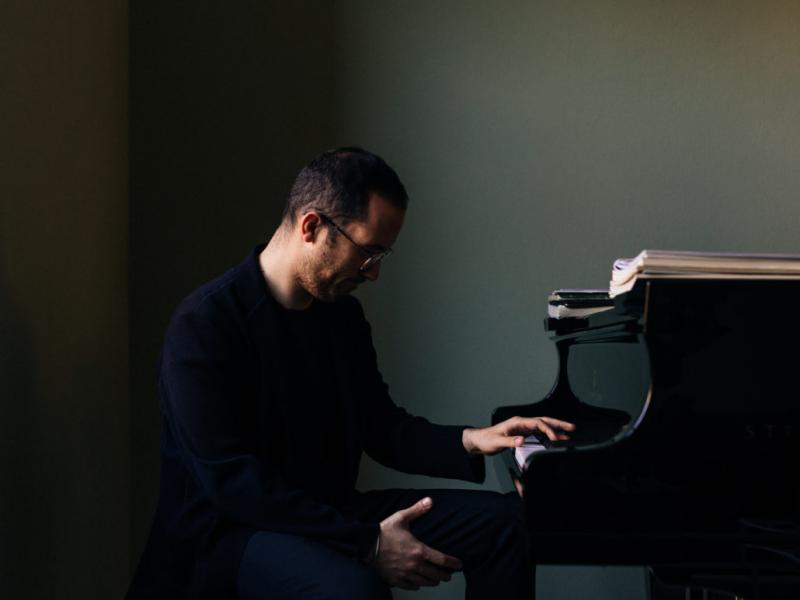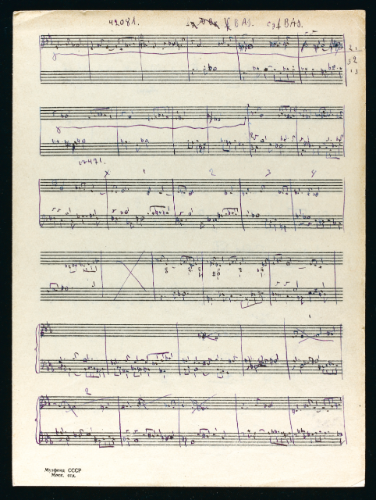Shostakovich 24 Preludes and Fugues, Igor Levit, Barbican review - an eagle's-eye view | reviews, news & interviews
Shostakovich 24 Preludes and Fugues, Igor Levit, Barbican review - an eagle's-eye view
Shostakovich 24 Preludes and Fugues, Igor Levit, Barbican review - an eagle's-eye view
Thought, colour and feeling in every phrase of this 20th century magnum opus

"Citizen. European. Pianist," declares Russian-born, Berlin-based Igor Levit on the front page of his website. One should add, since he wouldn't, Mensch and master of giants.
Tatyana Nikolayeva, Shostakovich's muse via her Bach playing, guarded the monument and was acclaimed here in the 1980s. Her interpretation was iron-cast but grey alongside Levit's rainbow palette. Barbican concertgoers who attended the Friday evening performance of the composer's shattering Eighth Symphony from idiosyncratic but rigorous Jukka-Pekka Saraste and the BBC Symphony Orchestra will have been gifted a special connection: the symphony ends in a luminous C major truce with the horrors that have knocked it down so often, and C major is also the start of the Preludes and Fugues composed - unbelievably in three and a half months - seven years later, Levit drawing his listeners in to another spell with hypnotic intimacy.
 This adventure, though, is not of the same, unremitting intensity; it works by contrast, and there are times when Shostakovich, not a great singing melodist like Prokofiev, turns out an unmemorable prelude or fugue theme, interesting only in the way it's mined; in the middle of both groups of 12, there are stretches where you feel he's simply working out schoolroom fugues as wrist exercises, though they're still the wrist exercises of a genius (pictured right: the manuscript of the opening to the Fugue in E flat). Shostakovich is always more at home setting out the diatonic - what in C major would be only the white notes - only to undermine it. Not everything here sounds like Shostakovich - which can be a good thing - though there are passing reminders of works he'd put in the bottom drawer after the persecution of Soviet composers in 1948, such as the song-cycle From Jewish Folk Poetry (especially poignant on the eve of Holocaust Remembrance Day). Even so, the whole can be more impressive than some of its parts.
This adventure, though, is not of the same, unremitting intensity; it works by contrast, and there are times when Shostakovich, not a great singing melodist like Prokofiev, turns out an unmemorable prelude or fugue theme, interesting only in the way it's mined; in the middle of both groups of 12, there are stretches where you feel he's simply working out schoolroom fugues as wrist exercises, though they're still the wrist exercises of a genius (pictured right: the manuscript of the opening to the Fugue in E flat). Shostakovich is always more at home setting out the diatonic - what in C major would be only the white notes - only to undermine it. Not everything here sounds like Shostakovich - which can be a good thing - though there are passing reminders of works he'd put in the bottom drawer after the persecution of Soviet composers in 1948, such as the song-cycle From Jewish Folk Poetry (especially poignant on the eve of Holocaust Remembrance Day). Even so, the whole can be more impressive than some of its parts.
Nevertheless Levit let nothing escape his rigorous but always expressive focus. That made the relatively few outbursts of violence, above all in the whirlwind of the D flat major Fugue, and the cumulative fugues at the end of each set of 12 - Shostakovich clearly divides up his sequence, making a new pure beginning with the F sharp major Prelude and Fugue of No. 13 - all the more overwhelming. Any sense of technical bursting at the seams was reined in with the pianist's intense rhythmic sense, and very rarely did he resort to the sustaining pedal to help with welters of sound.
Levit can bring orchestral force to the bigger fugues, or he can seem to retreat into Shostakovich's own private world, sometimes at the end of a sequence that starts with a big statement. Especially remarkable was the improvisatory feel to the B flat minor Fugue, which seems like some late Beethoven to be going on in the composer's head as it sleepwalks on the moon. It was not Levit's fault at all if this was the one point at which an astonishingly attentive and intense audience began to shift and shuffle; this work is hugely demanding on the listener. Cellist Steven Isserlis recently wrote that the concentration of a Japanese audience is a given, whereas you have to win it in the west; last night's full house was ready for the rigours of nearly three hours of piano-playing from the start. Its instant standing ovation was not a knee-jerk reaction to the sheer feat of realising an epic; we all knew we had been present at something utterly remarkable.
rating
Explore topics
Share this article
Add comment
The future of Arts Journalism
You can stop theartsdesk.com closing!
We urgently need financing to survive. Our fundraising drive has thus far raised £49,000 but we need to reach £100,000 or we will be forced to close. Please contribute here: https://gofund.me/c3f6033d
And if you can forward this information to anyone who might assist, we’d be grateful.

Subscribe to theartsdesk.com
Thank you for continuing to read our work on theartsdesk.com. For unlimited access to every article in its entirety, including our archive of more than 15,000 pieces, we're asking for £5 per month or £40 per year. We feel it's a very good deal, and hope you do too.
To take a subscription now simply click here.
And if you're looking for that extra gift for a friend or family member, why not treat them to a theartsdesk.com gift subscription?
more Classical music
 Lammermuir Festival 2025 review - music with soul from the heart of East Lothian
Baroque splendour, and chamber-ensemble drama, amid history-haunted lands
Lammermuir Festival 2025 review - music with soul from the heart of East Lothian
Baroque splendour, and chamber-ensemble drama, amid history-haunted lands
 BBC Proms: Steinbacher, RPO, Petrenko / Sternath, BBCSO, Oramo review - double-bill mixed bag
Young pianist shines in Grieg but Bliss’s portentous cantata disappoints
BBC Proms: Steinbacher, RPO, Petrenko / Sternath, BBCSO, Oramo review - double-bill mixed bag
Young pianist shines in Grieg but Bliss’s portentous cantata disappoints
 theartsdesk at the Lahti Sibelius Festival - early epics by the Finnish master in context
Finnish heroes meet their Austro-German counterparts in breathtaking interpretations
theartsdesk at the Lahti Sibelius Festival - early epics by the Finnish master in context
Finnish heroes meet their Austro-German counterparts in breathtaking interpretations
 Classical CDs: Sleigh rides, pancakes and cigars
Two big boxes, plus new music for brass and a pair of clarinet concertos
Classical CDs: Sleigh rides, pancakes and cigars
Two big boxes, plus new music for brass and a pair of clarinet concertos
 Waley-Cohen, Manchester Camerata, Pether, Whitworth Art Gallery, Manchester review - premiere of no ordinary violin concerto
Images of maternal care inspired by Hepworth and played in a gallery setting
Waley-Cohen, Manchester Camerata, Pether, Whitworth Art Gallery, Manchester review - premiere of no ordinary violin concerto
Images of maternal care inspired by Hepworth and played in a gallery setting
 BBC Proms: Barruk, Norwegian Chamber Orchestra, Kuusisto review - vague incantations, precise laments
First-half mix of Sámi songs and string things falters, but Shostakovich scours the soul
BBC Proms: Barruk, Norwegian Chamber Orchestra, Kuusisto review - vague incantations, precise laments
First-half mix of Sámi songs and string things falters, but Shostakovich scours the soul
 BBC Proms: Alexander’s Feast, Irish Baroque Orchestra, Whelan review - rapturous Handel fills the space
Pure joy, with a touch of introspection, from a great ensemble and three superb soloists
BBC Proms: Alexander’s Feast, Irish Baroque Orchestra, Whelan review - rapturous Handel fills the space
Pure joy, with a touch of introspection, from a great ensemble and three superb soloists
 BBC Proms: Moore, LSO, Bancroft review - the freshness of morning wind and brass
English concert band music...and an outlier
BBC Proms: Moore, LSO, Bancroft review - the freshness of morning wind and brass
English concert band music...and an outlier
 Willis-Sørensen, Ukrainian Freedom Orchestra, Wilson, Cadogan Hall review - romantic resilience
Passion, and polish, from Kyiv's musical warriors
Willis-Sørensen, Ukrainian Freedom Orchestra, Wilson, Cadogan Hall review - romantic resilience
Passion, and polish, from Kyiv's musical warriors
 BBC Proms: Faust, Gewandhausorchester Leipzig, Nelsons review - grace, then grandeur
A great fiddler lightens a dense orchestral palette
BBC Proms: Faust, Gewandhausorchester Leipzig, Nelsons review - grace, then grandeur
A great fiddler lightens a dense orchestral palette
 BBC Proms: Jansen, Royal Concertgebouw Orchestra, Mäkelä review - confirming a phenomenon
Second Prom of a great orchestra and chief conductor in waiting never puts a foot wrong
BBC Proms: Jansen, Royal Concertgebouw Orchestra, Mäkelä review - confirming a phenomenon
Second Prom of a great orchestra and chief conductor in waiting never puts a foot wrong
 BBC Proms: Royal Concertgebouw Orchestra, Mäkelä review - defiantly introverted Mahler 5 gives food for thought
Chief Conductor in Waiting has supple, nuanced chemistry with a great orchestra
BBC Proms: Royal Concertgebouw Orchestra, Mäkelä review - defiantly introverted Mahler 5 gives food for thought
Chief Conductor in Waiting has supple, nuanced chemistry with a great orchestra

Comments
unforgettable experience ,